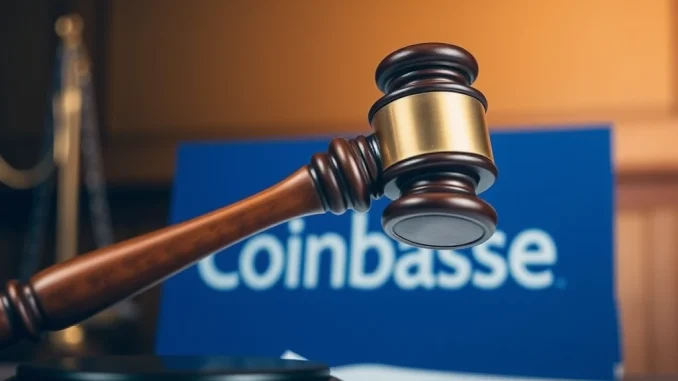
Big news for Coinbase and the crypto world! Illinois has become the latest state to drop its lawsuit against Coinbase concerning its staking services. Following in the footsteps of Kentucky, Vermont, and South Carolina, this move signals a potentially significant shift in the regulatory landscape surrounding crypto staking in the United States. Are we witnessing a turning point in the legal battles over crypto staking? Let’s dive into what this victory means for Coinbase and the future of crypto staking regulations.
Illinois Drops Coinbase Staking Lawsuit: What’s the Big Deal?
In a move that has sent ripples of relief through the cryptocurrency community, Illinois has officially dropped its lawsuit targeting Coinbase’s staking services. This development, first reported by CoinDesk, comes as a welcome surprise after a period of intense regulatory scrutiny. But what exactly does this mean, and why is it important?
- Domino Effect? Illinois is now the fourth state to withdraw similar legal challenges against Coinbase’s staking offerings. This trend suggests a possible shift in state-level regulatory approaches to crypto staking.
- Coinbase’s Stance: Coinbase has consistently maintained that its staking services are not securities. Paul Grewal, Coinbase’s Chief Legal Officer (CLO), has been vocal in defending the company’s position.
- Broader Implications: These dropped lawsuits could indicate a growing understanding, or perhaps a strategic recalibration, among state regulators regarding the nuances of crypto staking and its legal classification.
To better understand the context, here’s a quick look at the states that have recently dropped similar lawsuits:
| State | Status of Lawsuit |
|---|---|
| Kentucky | Dropped |
| Vermont | Dropped |
| South Carolina | Dropped |
| Illinois | Dropped |
Understanding Crypto Staking and the Legal Battle
For those new to the crypto world, staking services legal battles might seem confusing. Let’s break down what crypto staking is and why it’s become a point of contention with regulators.
What is Crypto Staking?
In simple terms, crypto staking is like earning interest on your cryptocurrency holdings. By participating in the network operations of certain cryptocurrencies (primarily those using Proof-of-Stake mechanisms), users can “stake” their coins to support the network’s security and validation of transactions. In return, they receive rewards, often in the form of additional cryptocurrency.
Why the Regulatory Scrutiny?
The core of the Coinbase legal battle and similar cases lies in the debate over whether crypto staking services should be classified as securities. If deemed securities, these services would be subject to stringent regulations, including registration and compliance requirements similar to those governing stocks and bonds.
Regulators are concerned that staking services might resemble investment contracts, where users invest assets with an expectation of profit derived from the efforts of others (in this case, the staking service provider). This interpretation could bring staking services under the purview of securities laws.
Coinbase’s Defense
Coinbase, along with other crypto firms, argues that staking is fundamentally different from traditional securities. They contend that:
- Not an Investment Contract: Staking is a core function of many blockchain networks, directly contributing to network operations rather than being purely a passive investment.
- No Centralized Entity Profit: Rewards are generated by the network protocol itself, not solely from Coinbase’s efforts.
- Transparency and Control: Users retain control over their staked assets and are aware of the risks and rewards involved.
The Impact of Dropped Lawsuits on Crypto Staking Regulations
The withdrawal of these lawsuits in multiple states could signal a significant shift in the regulatory landscape for crypto staking regulations. What are the potential implications?
Potential Benefits for Coinbase and the Crypto Industry
- Reduced Legal Uncertainty: Dropping lawsuits reduces immediate legal pressure on Coinbase and potentially other crypto firms offering staking services.
- Positive Precedent: These cases could set a precedent, influencing other states and even federal regulators to reconsider broad classifications of staking as securities.
- Market Confidence Boost: Positive legal developments often boost investor confidence in the crypto market, potentially leading to increased adoption and investment in staking services.
- Focus on Clearer Regulations: Instead of outright bans or restrictive classifications, regulators might be moving towards developing clearer, more nuanced regulations specifically tailored to crypto staking.
Challenges and the Road Ahead
While the dropped lawsuits are encouraging, the regulatory landscape for crypto is still evolving and faces challenges:
- SEC Scrutiny: Federal regulators, particularly the Securities and Exchange Commission (SEC), are still actively examining crypto staking. These state-level withdrawals don’t necessarily negate potential federal actions.
- Lack of Uniformity: Even with some states dropping lawsuits, regulatory approaches can still vary significantly from state to state, creating a patchwork of regulations that can be challenging for crypto businesses to navigate.
- Ongoing Legal Battles: Coinbase and other crypto companies are still facing various legal and regulatory challenges on multiple fronts. The fight for regulatory clarity is far from over.
What Does This Mean for You? Actionable Insights
For crypto enthusiasts and investors, the Illinois development and similar cases offer several key takeaways:
- Stay Informed: Keep abreast of regulatory developments in the crypto space, both at the state and federal levels. Regulatory changes can significantly impact the value and utility of crypto assets.
- Understand Staking Risks and Rewards: If you’re involved in crypto staking, ensure you understand the risks involved and the terms of service offered by staking platforms.
- Support Regulatory Clarity: Engage with advocacy groups and industry organizations working towards sensible and clear crypto regulations. Your voice matters in shaping the future of crypto policy.
- Monitor Coinbase and Industry Leaders: Pay attention to how Coinbase and other industry leaders respond to and navigate these regulatory challenges. Their actions and statements can provide valuable insights into the evolving landscape.
Conclusion: A Ray of Hope for Crypto Staking?
Illinois dropping the Illinois Coinbase lawsuit, along with other states, is undoubtedly a positive development for Coinbase and the broader crypto industry. It suggests a potential shift towards a more nuanced understanding of crypto staking by regulators. While challenges remain, and federal scrutiny is still a factor, these victories offer a ray of hope for clearer and more favorable regulations for crypto staking in the future. The journey towards regulatory clarity in the crypto space is ongoing, but these recent developments are certainly steps in the right direction, offering a sense of relief and optimism for the future of crypto innovation in the US.



